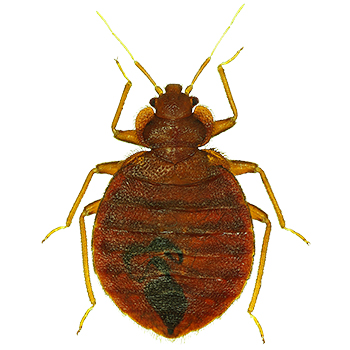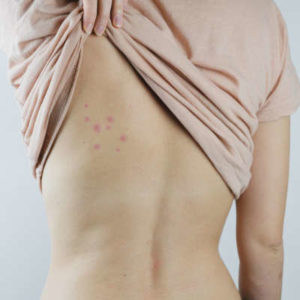Bed Bug Treatment: When to Hire a Bed Bug Exterminator

Bed bugs are a menace that can ravage your home or place of business and make your day-to-day life uncomfortable. Bed bugs like to make their homes in mattresses, clothing, carpeting, pillows, chairs, electrical outlets, and behind picture frames. The good news is you can get rid of bed bugs and keep them away by taking a few simple steps. In New Jersey, Pennsylvania, Maryland, and Delaware, the key is to be proactive—don’t wait for the problem to get out of hand before taking action and seeking the help and recommendations of pest control experts. To protect your home or business from bed bugs, you need to learn about the behavior of this pest, take steps for prevention, and find a professional bed bug control expert should an infestation occur.
What Are Bed Bugs?
 Bed bugs are small insects, about 1/4 inches in diameter with brown bodies and darker heads. These pests feed on the blood of humans and animals. Often, people have bed bugs and don’t even know it. Since these insects are so small, it’s common for people to blame the itching, allergies, sleeping problems, and other effects on something else. However, if you know how to identify—and prevent—them, you can reduce the chance of bed bugs entering your home.
Bed bugs are small insects, about 1/4 inches in diameter with brown bodies and darker heads. These pests feed on the blood of humans and animals. Often, people have bed bugs and don’t even know it. Since these insects are so small, it’s common for people to blame the itching, allergies, sleeping problems, and other effects on something else. However, if you know how to identify—and prevent—them, you can reduce the chance of bed bugs entering your home.
How Do I Identify Bed Bugs?
Even though bed bugs are tiny, the easiest way to detect them is to know what they look like. Bed bugs have the following characteristics:
- Small, about 1/4-inch in both directions
- Brown, either dark or light, and they can turn red after biting someone
- Small heads with much larger bodies
- Eggs that are about 1 millimeter long and pale white
- Ridged shells like that of tiny brown beetles
- Bed bugs leave blood marks on sheets or cushions
- Bed bug bites are grouped in clusters, a line or a zigzag pattern—mosquito bites are different because they usually aren’t grouped together
- Shed skins
- Bed bugs leave fecal spots on mattresses, sheets, or walls
How Do I Prevent Bed Bugs?
Pest control experts understand bed bugs as opportunistic travelers. These insects love to take any chance they can to catch a ride into your home or business. The easiest way to protect your workplace or home is to prevent them from catching a ride on your clothing or in your luggage. In addition to coming back with you as you return from a trip, there are other ways bed bugs can try to move into your business or home. Here are some exterminator tips that can help you prevent bed bugs:
- When you stay at a hotel, check the luggage rack to see if any bed bugs have made it a temporary home. If the rack has hollow legs, you can take a look inside. You should also check where the supporting straps meet the frame.
- Check all the furniture you buy for bed bug signs, especially used items. To properly check, look in the crevices between cushions and along any fluting. Also, check the joints, such as where the back or the legs meet the seat.
- Cover your mattresses and box springs with protective layers. Light-colored covers both shield your mattress and make it easier to spot bed bug signs.
- Vacuum frequently to suck up stray bed bugs. It’s important to immediately dispose of the vacuum bag to avoid an infestation.
- Check your clothing after visiting high-traffic areas like movie theaters, arenas, or any place where a bed bug may have hitched a ride.
How Did I Get Bed Bugs?
Chances are, you got bed bugs from somewhere or someone else. You can also get them from a furry pet that has been exposed. Bed bugs are common in hotel rooms, movie theaters, airports, or anywhere else hundreds of people pass through. You have a higher risk in these areas because each room creates an opportunity for exposure to a series of guests that come from a variety of homes. Every home or business in New Jersey, Pennsylvania, Maryland, and Delaware is a potential environment for these little critters.
From Someone Else’s House
You may also pick up bed bugs while visiting a friend or neighbor. They may not even know they have an infestation and end up, unwittingly, passing it on to you. If your jacket, scarf, or other clothing comes into contact with that of your coworkers or classmates, some bugs may have hitched a ride into your home or business.
From an Adjoining Apartment
Your neighbors may have inadvertently shared their bed bug problem with you. If you live in a multi-family home, you should make sure you check all cracks and crevices that could allow the pests to go from your neighbor’s apartment to yours.

What do Bed Bugs look like?
What Are the Effects of Bed Bugs in and Around My Home or Business?
Bed bugs are not known to carry disease, so you don’t have to worry about catching a virus or another health problem from someone else who has been bitten by a bed bug. However, this doesn’t mean they don’t have a significant effect on your home, business, or well-being.
Bed Bugs Affect Your Physical Health
Some people are allergic to bed bug bites. If this is the case, you may experience hives. These are red bumps that form on your skin when histamines release in the body. They’re usually itchy and can spread to other parts of your body. Regardless of whether or not you’re allergic to bed bugs, you’ll likely have a reaction if they bite you. Bed bug control experts explain some ways the bites can affect your skin:
- Small, raised bumps that are clear in the middle
- Bumps can also be itchy and have darker centers surrounded by lighter swollen areas
- Small, red welts or bumps in a zigzag pattern or a relatively straight line
- Papular eruptions on the skin that are either painful or inflamed
Also, scratching bites can result in skin problems, including, red skin, scarring, and infection. Often, you can differentiate mosquito bites from those of bed bug bites by examining the bumps and marks left behind. Pest control experts explain if they appear in clusters or in a line, they are most likely bed bug bites. Mosquitos tend to bite once and then fly off. Although bed bugs can also bite just once, they often have to dislodge and crawl to another spot in order to get their fill. This results in groups of bumps or marks.
Bed Bugs Affect Your Social Life
Along with other crawling pests, bed bugs can spread to the clothing of people who visit your home. If your home is known to host these pests, it may have a significant ef fect on your social life. Not only will people be less likely to visit, but they may also think twice before inviting you over.
fect on your social life. Not only will people be less likely to visit, but they may also think twice before inviting you over.
Bed Bugs Affect Your Mental Health
Because bed bugs are so small, they can feel like invisible predators. People with bed bugs have been known to experience higher levels of stress simply because they know they’re around. As you struggle to find the pesky insects, the stress increases, particularly because it’s hard to know if you’ve thoroughly rooted them out.
Bed Bugs Affect Your Sleep
Bed bugs like to bite when you’re sleeping. Because your body is in one place, it’s easy for them to feast without interruption by swatting hands and itching fingernails. Bed bugs secrete an anesthetic as they feed, and even though this numbs your skin, it still may interrupt your sleep by the itching sensation you feel afterward.
“The anaesthetic in bed bug bites is so strong that even if you were actively awake and watching them bite you, you still wouldn’t feel anything,” says Craig S. ACE, PHE, Viking Pest’s Service Director .
How Long Do Bed Bugs Live?
Bed bugs live for around 10 months. If they don’t have any blood on which to feed, they can still live for up to five months—or even longer. During that time, however, pest control experts explain a female bed bug can lay hundreds of eggs. After it hatches, it’s ready to start laying eggs in around five weeks. The eggs take about 17 days to hatch, and the young bugs start biting almost immediately. Bed bugs don’t waste time with mating in order to expand their colony. It’s best to take action right away if you see any bed bug signs in or around your business or home.
How Do I Prepare and What Should I Expect From a Bed Bug Treatment?
To prepare for a bed bug treatment for your home or business throughout New Jersey, Pennsylvania, Delaware, and Maryland, you should gather the following information for your bed bug treatment specialists at Viking Pest:
- The places you have seen bed bugs in your home or place of business
- When you first started seeing the pests
- The number of bed bugs you’ve seen
- Whether they have bitten those in your household and in which rooms those people sleep
- The places you’ve traveled to the last few months
In order to prepare your home or business, you should:
- Cover utensils nearby the areas that are going to be treated
- Remove plants and pets from the areas
- Cover or protect all valuable possessions and antiques
Depending on the treatment that the pest control experts are going to use, you can expect technicians to enter your business or home and use a liquid treatment that eradicates bed bugs on contact, or the bed bug control professional may also use heat to treat clothing, sheets, other bedding, toys, and other specific items.
To prepare for bed bug heat treatment, move all furniture about 2 feet from the walls, close the windows, and turn off A/C and heating units. If the room has any items that may be affected by heat, such as electronics, medications, and DVDs, place them in tightly sealed plastics bags or garbage bags.
How to Prevent a Bed Bug Reinfestation
Even after you have bed bugs eradicated, they may come back. To prevent a reinfestation, you should carefully clean and inspect luggage before leaving houses of friends and family members as well as hotel rooms and other paid places of lodging, such as rental homes and condos. Check for places where bed bugs could have entered from an adjoining home, such as around the connecting doors or windows. Seal off cracks or holes in walls or floors. Keep an eye out for bed bug signs, and if you see any, act immediately. Call the bed bug control professionals at Viking Pest right away.
Why Did Bed Bugs Come Back After a Treatment Was Done?
Usually, the return of bed bugs after treatment means they were brought in from somewhere else. A thorough treatment can eliminate bed bugs from your home or business, but it has no effect on the places you visit. If they’ve crawled back in, it’s likely because they hitched a ride on your clothes or in your luggage. It’s also very important that you don’t remove items from the home or office space before or during a bed bug treatment, because this could lead to reinfestation if those items were unknowingly infested with bed bugs.
Do You Have to Leave Your House During a Bed Bug Treatment?
Yes, you should leave your house during the treatment and stay out for at least four or five hours after the treatment has been completed.















